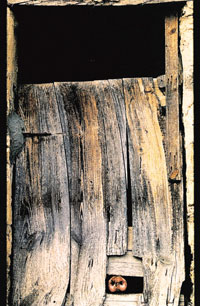Hello and welcome to the history page. After hearing the moving personal testimony of Rafael Sainz last week, we shall resume our narrative where we left off, with the splintered and rather ineffectual five-week period of Republican rule. Readers will recall from our instalment two weeks ago that the combined militias of Bayo and Uribarry initiated their occupation with a rampage of the island’s rural churches and the targeted killings of twenty-one local clergymen. Given the traditional Ibicenco reverence towards all things religious, it was only natural that these deeds did not generate a high degree of solidarity between the islanders and their new warlords. Consequently, the latter’s attempts at restructuring local economy and political life met with apathy at best and a stony wall of resistance in the majority of cases.
Also in operation in these early days of Republican occupation was a bitter power struggle between Bayo and Uribarry as to which of the two men would assume maximum leadership in the aftermath of invasion. Bayo condemned the undisciplined methods and indiscriminate sackings that characterized Uribarry’s motley recruits and made it clear that he would not allow such practices to continue. Unwilling to play second fiddle to Bayo’s military superiority, Uribarry and his troops withdrew from Ibiza on 10th August to return to their home turf of Valencia.
This inauspicious beginning to Republican rule quickly degenerated into a near total breakdown of Ibicenco society and Bayo’s eventual departure from the island as well. The fatal blow to his tenuous supremacy in the Mediterranean theatre of war occurred on 3rd September when his efforts to incorporate Majorca into the Republican domain ended in failure. As the Ibicenco commentator, Artur Parron, writes in his candid chronicle of the Civil War in the Pitiuses, “… the authority of [the anti-fascist] Committee in Ibiza was seriously undermined by Bayo’s defeat on the larger island; it became incapable of enforcing the economic and labour measures it had instituted, and, above all, of maintaining public order. … The disorganization and indiscipline of the troops fuelled the precariousness of public order and led to indiscriminate repression.” Interestingly, Parron goes on to qualify that, “One must not think that these abuses were committed only by the troops that disembarked on 8th August. The new situation proved fertile ground for the waging of personal reprisals on questions of debts and property rights among the very islanders themselves.” The brutal honesty of Parron’s observations can only leave one aghast at the hidden seeds of ruination that lie buried within the deepest layers of any society and which often germinate in times of war.
Anarchy Arrives
The events following Bayo’s withdrawal are as convoluted and imbrued as one would expect from a war-torn territory where collective hysteria had become the driving force behind human behaviour. Following Bayo’s departure on the 3rd - 4th September and the ensuing dissolution of the anti-fascist Committee, the lawless islands were again reoccupied on 9th - 10th September by a large militia of anarchists under the leadership of Juan Yagüe. The vacuum of power in Ibiza allowed Yagüe and his 500-strong contingent to seize control of the island’s infrastructure without the slightest hint of opposition. One of their first moves was the take-over of the local newspaper, the Diario de Ibiza, which they renamed Worker Solidarity, intending to use it as a propaganda tool for their labour union, CNT. Less than 24 hours later, however, the plot twists yet again, forcing the anarchists to withdraw as suddenly as they had arrived, but not without first inflicting a savage blow to Pitiusan society…
Meanwhile in Majorca, the newly dominant Nationals began a full-scale campaign to bring the Pitiuses back into the fold and began with a light bombing of Vila on 12th September. Although this preliminary action did not cause any casualties, it did serve to spread panic among an already terrified population. On the following noon, 13th September, three Italian aircraft delivered a second round of more intensive bombing, this time killing an estimated forty victims and causing severe material damages. This action in Ibiza was but a foretaste of the Italian military prepotency which, operating from a solid base in the Mediterranean, would later be rained on Barcelona and the eastern Spanish seaboard. Well-known is the fact that Mussolini’s generous aid to Franco constitutes one of the decisive factors in the latter’s victory.
September Massacre
Returning to Ibiza: with the Republican forces now completely disintegrated, isolated pockets of anarchist militias visited their wrath on the prison in Dalt Vila, machine-gunning the entire body of political captives housed therein. Of roughly one hundred inmates - including priests, military men, rightwing political leaders, the manufacturer Marí Mayans and the banker Abel Matutes i Torres - ninety-three were killed. That night numerous families escaped to Valencia, Algeria and Majorca, informing the National leaders in the Balearic capital of the utter social decomposition in the Pitiuses. It was not until 18th September, however - five days later - that the Italian destroyer, Malocello, made a reconnaissance tour to Ibiza to assess the situation, returning the same day to Palma. Upon receiving the report that the island was indeed a political no-man’s land, several well-organized companies of Falangists and assorted National factions arrived in the Pitiuses on 20th September, occupying both Ibiza and Formentera and initiating a bloody counter-repression that would long outlast the period of wartime proper.
Closing
On that depressing note we will end our sad chronicle for this week. Most of us, I am willing to wager, haven’t the heart to listen to anymore of the madness that took place during the tragic summer of 1936. For those who can pluck up their courage, we will be back next week to discuss the period of National occupation and the important role of the Falangists in the wartime military state. Until then.
Emily Kaufman
emilykaufman@ibizahistoryculture.com

